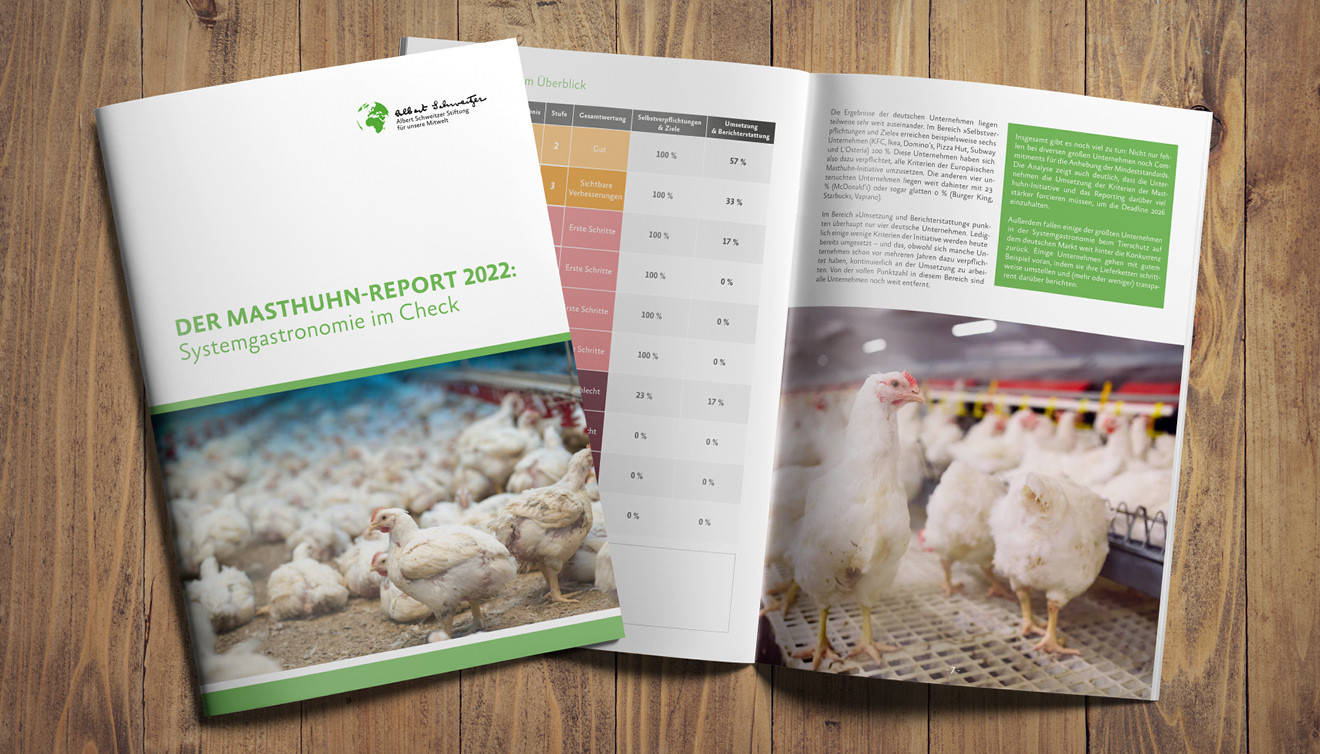
Every year, more than 620 million chickens in Germany are raised for their meat and slaughtered after short, painful lives. In conventional farming, the suffering of these chickens is particularly intense: Overbreeding, cramped sheds and agonizing slaughter practices are a daily occurrence for most animals in the system. The first-ever German edition of The Pecking Order assesses leading fast food chains in Germany and the concrete animal welfare standards implemented by these chains in farming chickens raised for meat, so-called broiler chickens.
Methods of assessment
The assessment was based on the criteria of the European Chicken Commitment (ECC). This Commitment, co-developed by our foundation, defines a minimum set of requirements and criteria for broiler production. In doing so, we support the food service sector in making a significant contribution to both animal welfare and sustainability. For instance, the criteria of the ECC aim to reduce overbreeding and provide more space and manipulable material for the animals. You can learn more about the criteria of the ECC here as well as in the full report we published in cooperation with World Animal Protection.
The assessment covered two pillars: Pillar 1 (»Commitments and Targets«) allows the companies to score points by declaring their adoption of the criteria of the ECC until 2026 at the latest. The more criteria of the ECC a company adopts, the more points are awarded. Pillar 2 (»Implementation and Reporting«) covers the actual implementation: A company achieves the full score when all products in its German supply chains meet all criteria of the ECC and the company reports on them transparently and unambiguously.
Both pillars contribute equally to the overall result. Depending on the total number of points scored, the companies achieve one of six tiers, with 1 being the best and 6, the worst.
Results at a glance
In some cases, the results of the German companies differ considerably from each other. Regarding the »Commitments and Targets« pillar, for example, six companies (Domino's, Ikea, KFC, L'Osteria, Pizza Hut, and Subway) achieve 100%. This means that these companies have committed to implementing all the criteria of the ECC. The other four companies assessed fall far behind by scoring a mere 23% (McDonald's) or even a flat 0% (Burger King, Starbucks, Vapiano).Regarding the »Performance Reporting« pillar, just four German companies scored at all. Only a few of the criteria of the ECC are already being implemented—despite the fact that some companies already pledged to work continuously on the implementation several years ago. In this area, all companies are a long way from scoring full points.
On the whole, there is significant room for improvement: Many multinational companies have not at all committed to raising their animal welfare standards yet. Those who have need to vigorously expedite their implementation as well as improve on their progress reporting in order to reach their goals by 2026 and collectively implement a new minimum welfare standard for the industry. The analysis clearly shows that when it comes to animal welfare, some of the largest food service companies on the German market lag far behind their competitors. While some do nothing, other companies are leading by example in gradually transforming their supply chains and reporting on it (more or less) transparently.
Detailed company results
Our conclusion
The Pecking Order report shows that German companies still have a long way to go: Significantly more needs to be done for animal welfare, both in terms of the number of commitments, and in terms of implementation. The fact that some companies take the implementation seriously must not distract from the reality that other companies show massive failures in goal setting, implementation and reporting. The partial transparency by KFC and Ikea is too little to ensure real change. Especially in view of the deadline—the companies have committed to implementing the criteria by 2026 at the latest—there still remains a lot to be done in order to ensure that the pledge for more animal welfare does not remain mere lip service. Only with broad support for the ECC from the food service sector and the food industry as a whole will the necessary transformation of the market succeed. Additionally, the implementation of the minimum standard on a Europe-wide scale requires the companies to make a declaration of support for the whole of Europe, and not just for individual countries.Companies that have not yet joined the ECC should follow suit as soon as possible in order to keep up. Animal welfare and sustainability are no short-term trends. Customers are demanding for change—those who miss out on the switch to improved husbandry conditions now will no longer be relevant in the decades to come.